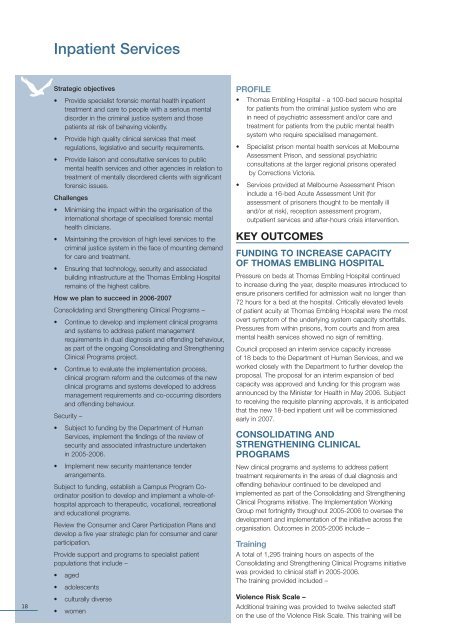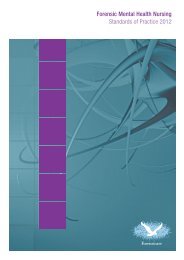Annual Report 2005-2006 - Forensicare
Annual Report 2005-2006 - Forensicare
Annual Report 2005-2006 - Forensicare
Create successful ePaper yourself
Turn your PDF publications into a flip-book with our unique Google optimized e-Paper software.
Inpatient Services<br />
18<br />
Strategic objectives<br />
• Provide specialist forensic mental health inpatient<br />
treatment and care to people with a serious mental<br />
disorder in the criminal justice system and those<br />
patients at risk of behaving violently.<br />
• Provide high quality clinical services that meet<br />
regulations, legislative and security requirements.<br />
• Provide liaison and consultative services to public<br />
mental health services and other agencies in relation to<br />
treatment of mentally disordered clients with significant<br />
forensic issues.<br />
Challenges<br />
• Minimising the impact within the organisation of the<br />
international shortage of specialised forensic mental<br />
health clinicians.<br />
• Maintaining the provision of high level services to the<br />
criminal justice system in the face of mounting demand<br />
for care and treatment.<br />
• Ensuring that technology, security and associated<br />
building infrastructure at the Thomas Embling Hospital<br />
remains of the highest calibre.<br />
How we plan to succeed in <strong>2006</strong>-2007<br />
Consolidating and Strengthening Clinical Programs –<br />
• Continue to develop and implement clinical programs<br />
and systems to address patient management<br />
requirements in dual diagnosis and offending behaviour,<br />
as part of the ongoing Consolidating and Strengthening<br />
Clinical Programs project.<br />
• Continue to evaluate the implementation process,<br />
clinical program reform and the outcomes of the new<br />
clinical programs and systems developed to address<br />
management requirements and co-occurring disorders<br />
and offending behaviour.<br />
Security –<br />
• Subject to funding by the Department of Human<br />
Services, implement the findings of the review of<br />
security and associated infrastructure undertaken<br />
in <strong>2005</strong>-<strong>2006</strong>.<br />
• Implement new security maintenance tender<br />
arrangements.<br />
Subject to funding, establish a Campus Program Coordinator<br />
position to develop and implement a whole-ofhospital<br />
approach to therapeutic, vocational, recreational<br />
and educational programs.<br />
Review the Consumer and Carer Participation Plans and<br />
develop a five year strategic plan for consumer and carer<br />
participation.<br />
Provide support and programs to specialist patient<br />
populations that include –<br />
• aged<br />
• adolescents<br />
• culturally diverse<br />
• women<br />
PROFILE<br />
• Thomas Embling Hospital - a 100-bed secure hospital<br />
for patients from the criminal justice system who are<br />
in need of psychiatric assessment and/or care and<br />
treatment for patients from the public mental health<br />
system who require specialised management.<br />
• Specialist prison mental health services at Melbourne<br />
Assessment Prison, and sessional psychiatric<br />
consultations at the larger regional prisons operated<br />
by Corrections Victoria.<br />
• Services provided at Melbourne Assessment Prison<br />
include a 16-bed Acute Assessment Unit (for<br />
assessment of prisoners thought to be mentally ill<br />
and/or at risk), reception assessment program,<br />
outpatient services and after-hours crisis intervention.<br />
KEY OUTCOMES<br />
FUNDING TO INCREASE CAPACITY<br />
OF THOMAS EMBLING HOSPITAL<br />
Pressure on beds at Thomas Embling Hospital continued<br />
to increase during the year, despite measures introduced to<br />
ensure prisoners certified for admission wait no longer than<br />
72 hours for a bed at the hospital. Critically elevated levels<br />
of patient acuity at Thomas Embling Hospital were the most<br />
overt symptom of the underlying system capacity shortfalls.<br />
Pressures from within prisons, from courts and from area<br />
mental health services showed no sign of remitting.<br />
Council proposed an interim service capacity increase<br />
of 18 beds to the Department of Human Services, and we<br />
worked closely with the Department to further develop the<br />
proposal. The proposal for an interim expansion of bed<br />
capacity was approved and funding for this program was<br />
announced by the Minister for Health in May <strong>2006</strong>. Subject<br />
to receiving the requisite planning approvals, it is anticipated<br />
that the new 18-bed inpatient unit will be commissioned<br />
early in 2007.<br />
CONSOLIDATING AND<br />
STRENGTHENING CLINICAL<br />
PROGRAMS<br />
New clinical programs and systems to address patient<br />
treatment requirements in the areas of dual diagnosis and<br />
offending behaviour continued to be developed and<br />
implemented as part of the Consolidating and Strengthening<br />
Clinical Programs initiative. The Implementation Working<br />
Group met fortnightly throughout <strong>2005</strong>-<strong>2006</strong> to oversee the<br />
development and implementation of the initiative across the<br />
organisation. Outcomes in <strong>2005</strong>-<strong>2006</strong> include –<br />
Training<br />
A total of 1,295 training hours on aspects of the<br />
Consolidating and Strengthening Clinical Programs initiative<br />
was provided to clinical staff in <strong>2005</strong>-<strong>2006</strong>.<br />
The training provided included –<br />
Violence Risk Scale –<br />
Additional training was provided to twelve selected staff<br />
on the use of the Violence Risk Scale. This training will be














